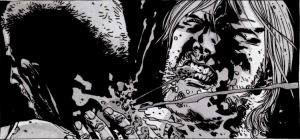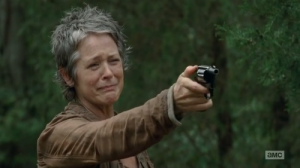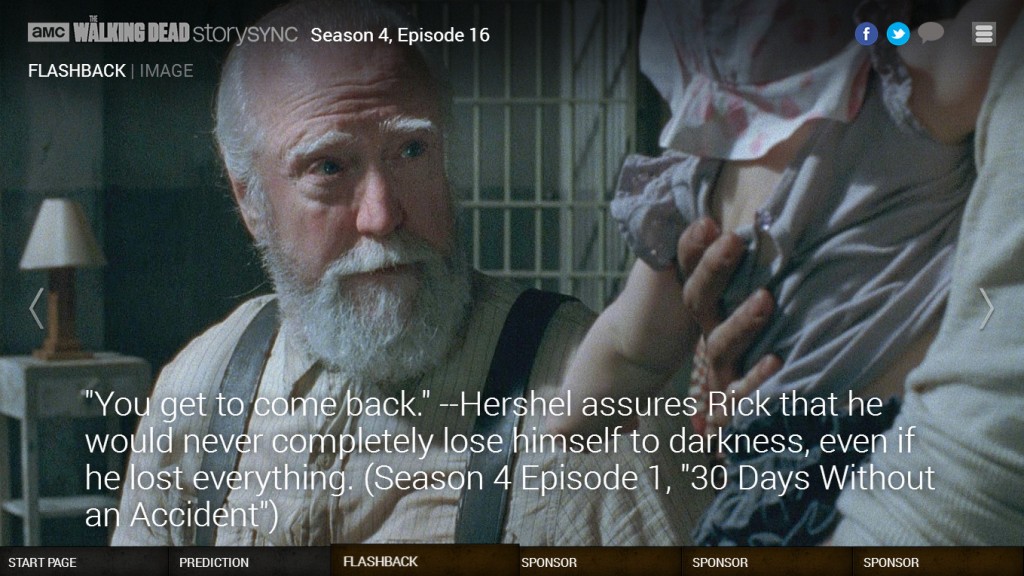Somewhere in the first half season two of The Walking Dead, I tapped out. This was a zombie show that had a severe lack of zombies popping out to actually kill people. Instead, there were a lot of people whining and bitching at each other, while accomplishing a whole lot of nothing.
I returned for season three, but more importantly, I took the time to read volume one of the comic on which the show is based, where creator Robert Kirkman writes:
“…I want to explore how people deal with extreme situations and how events CHANGE them. […] You guys are going to get to see Rick change and mature to a point that when you look back on [issue #1], you won’t even recognize him. […] This book is more about watching Rick survive than it is about watching zombies pop around the corner and scare you.”
Oops. For someone who claims to love character development, I definitely wasn’t appreciating the show for what it truly was: a “survivalist adventure.”
Rick’s journey has been a long one, going from good-hearted cop to cold killer, all while struggling with the heavy burden of stuff and things, and leadership. He spent this season shirking those leadership responsibilities somewhat, letting the rather inept council handle the details earlier on, but then taking matters into his own hands with his decision to kick Carol off of the island. The season finale–simply titled “A”–opened with what seemed like a completely broken Rick, his humanity lost forever.
But as Hershel told him back in “30 Days without an Accident,” the first episode of this season:
“You get to come back.”
The finale featured several flashbacks showing Rick in better moments this season, such as sharing time with his son, enjoying the pleasures of farming–a seeming return to normalcy within the insanity of a crumbled world. The flashbacks were poignant and bittersweet, not merely because we got to see Hershel again, but because, for me, it assured me that Rick was not lost. Even as, in the present, he ripped out a gang leader’s throat with his own teeth and stabbed his son’s attacker over and over and over and over and over… I was confident that the show was telling me that Rick had reached a turning point–not one that turned him into a monster like the Governor, but a turning point that will finally give us the strong, dependable leader that Rick is meant to be. The man who no longer struggles with crushing doubt and guilt when he has to do what is necessary to protect his family. Oh sure he might slaughter a living human being once in a while, but only if they really, really deserve it.
 Some might feel the show went too far, and I was surprised to see my Twitter feed filled with comments from people who read the comic and were unhappy that the show chose to re-enact such a brutal scene, which included the attempted rape of Rick’s teenaged son, Carl. I certainly didn’t enjoy the scene; it was incredibly uncomfortable from beginning to end. But that’s the point. We can’t watch a show about the end of the world and the decimation of society and not expect to be disturbed by the darkness we find even in the best of us.
Some might feel the show went too far, and I was surprised to see my Twitter feed filled with comments from people who read the comic and were unhappy that the show chose to re-enact such a brutal scene, which included the attempted rape of Rick’s teenaged son, Carl. I certainly didn’t enjoy the scene; it was incredibly uncomfortable from beginning to end. But that’s the point. We can’t watch a show about the end of the world and the decimation of society and not expect to be disturbed by the darkness we find even in the best of us.
AMC’s Story Sync asked viewers if they thought Rick’s vicious response was justified. My answer? Absolutely. I’m a mother of two girls. I don’t need a zombie apocalypse to admit that I would probably hulk out and smash anyone who tried to hurt my babies, too.
And that’s what really has gotten me about the reactions to this season, most notably in response to Rick last night, and prior to that, Carol’s murder of two sick people, and later her murder of a young girl who had just murdered her sister. There is a lot of judgment doled out against these characters, as if any of us know how we will react if put in a situation as inconvenient as the end of the world.
First of all, let me make it clear that I am firmly on Team Carol. She is also a character that has undergone significant growth, transitioning from cowed wife, to grieving mother, to determined survivor. While Rick was hiding in his garden, floundering with the burdens of leadership, Carol was busy teaching the children how to survive, and doing what she thought was best to save the prison from a deadly virus (though we all know that proper hand washing with non-zombie infested water would have sufficed). Perhaps if Carl had bothered to take Carol’s Survival 101 instead of ratting her out to Rick, he would be hated less by the general public who unanimously seem to want him removed from the equation. He’s come a long way from “Stay in the House, Carl,” but people still see him as the annoying kid. Well, okay, he is annoying, but I blame poor parenting for that. Neither Rick nor Lori have taught him much by way of responsibility, much less survival. Giving him a hat and gun and telling he’s a man doesn’t quite cut it, Rick.
 At least Carl isn’t, you know, “crazy,” like poor Lizzie, whose sociopathic tendencies took a turn for the worse in “The Grove.” Lizzie transitioned from flaying bunny rabbits and naming walkers, to killing her own sister to prove to the grown-ups that she was right about walkers just being a new and improved form of life. I had long insightful conversations with friends where we discussed the symptoms of Lizzie’s mental instability and Carol’s subsequent decision. Some of my friends have suffered serious mental concerns of their own, and, while the internet questioned whether or not The Walking Dead had gone too far with the child killing, our general consensus was that Lizzie’s symptoms were well represented and, in a world where there is no opportunity to seek help for a child who has proven to be a serious threat to both herself and those with her, Carol’s decision was harsh, but it was an understandable and acceptable one, and certainly not something she took lightly. I loved that the follow through involved her confession to Tyreese about murdering his sick girlfriend. And Tyreese, who had watched and accepted her murder of Lizzie, forgave her. It was a surprising step for the show to take, and it truly impressed me.
At least Carl isn’t, you know, “crazy,” like poor Lizzie, whose sociopathic tendencies took a turn for the worse in “The Grove.” Lizzie transitioned from flaying bunny rabbits and naming walkers, to killing her own sister to prove to the grown-ups that she was right about walkers just being a new and improved form of life. I had long insightful conversations with friends where we discussed the symptoms of Lizzie’s mental instability and Carol’s subsequent decision. Some of my friends have suffered serious mental concerns of their own, and, while the internet questioned whether or not The Walking Dead had gone too far with the child killing, our general consensus was that Lizzie’s symptoms were well represented and, in a world where there is no opportunity to seek help for a child who has proven to be a serious threat to both herself and those with her, Carol’s decision was harsh, but it was an understandable and acceptable one, and certainly not something she took lightly. I loved that the follow through involved her confession to Tyreese about murdering his sick girlfriend. And Tyreese, who had watched and accepted her murder of Lizzie, forgave her. It was a surprising step for the show to take, and it truly impressed me.
Back to “A,” I loved that it followed up on Carl’s discomfort over his dad’s actions by having Michonne reveal the last piece of her puzzle: how she lost her son and came to own her “pets.” When her boyfriend and his friend got high and allowed little Andre to die while they were bitten, Michonne broke. She became, by her own admission, a monster. But she came back thanks to Andrea and the people she found at the prison. I’d like to believe that Michonne’s confession helped Carl deal with his own feelings and, while he believes himself to be a monster, he will come to recognize that we all harbour darkness. And when the world falls apart and there are no more rules, it becomes imperative that we recognize that darkness, and respect it, and remember that, no matter how much we lose, we can always come back.
As for everything else that went on in the finale, I was pleased. This last half of the season brought us lots of strong character development and the sense of strong bonds that continue to hold the group together. We’ve lost a few along the way, (though Beth might still be around – not that her sister Maggie seemed to care, having not mentioned her at all on the way to Terminus), but there is the definite sense that this new solid state of Rick is going to make his final words a fact. The people of Terminus have screwed with the wrong family.
(Plus I fully expect Carol to swoop into Terminus, guns blazing, with baby Judith strapped to her back, and Tyreese following in a tank. What? A girl can dream.)


